
Heart disease remains a leading cause of death worldwide, but did you know that the signs and symptoms can vary significantly between men and women?
This crucial difference often means that heart disease may go unrecognized, especially in women. Understanding these variations is not just a matter of medical curiosity; it’s essential for early detection and treatment.
This review aims to shed light on the distinct signs and symptoms of heart disease in men and women.
Heart disease encompasses a range of conditions affecting the heart’s structure and function.
The most common type, coronary artery disease, involves the narrowing or blockage of the heart’s arteries, leading to a decrease in blood flow to the heart muscle. This can result in chest pain (angina), heart attacks, and other serious complications.
Traditionally, heart disease and its symptoms have been studied more extensively in men, leading to a clearer understanding of its presentation in this group.
The most recognized symptom of heart disease in men is chest pain or discomfort, often described as a squeezing, pressure, or fullness in the chest. This pain may radiate to the shoulders, neck, jaw, or back.
Other common symptoms in men include:
- Shortness of breath
- Nausea or vomiting
- Cold sweats
- Dizziness or lightheadedness
Men are more likely to report classic symptoms of a heart attack, such as chest pain, and as a result, may seek medical attention more quickly during cardiac events.
Signs and Symptoms in Women
Research has revealed that women often experience heart disease differently than men. Women are more likely to have subtle or atypical symptoms, which can be easily overlooked or misattributed to less serious conditions.
The most common heart attack symptom in women is some type of pain, pressure, or discomfort in the chest. However, it’s not always severe or the most prominent symptom.
Women may also experience:
- Unusual fatigue
- Sleep disturbances
- Shortness of breath without chest pain
- Indigestion or gas-like pain
- Upper back, shoulder, or throat pain
- Jaw pain or pain that spreads to the arm
These symptoms can be more subtle than the classic chest pain and may occur more often when women are resting or even asleep. Additionally, psychological symptoms like anxiety may precede a heart attack in women.
Why the Difference?
The reasons behind these gender differences in heart disease symptoms are not entirely understood but are thought to involve variations in how heart disease develops, hormonal differences, and possibly differences in pain perception between men and women.
Women’s arteries are smaller and may become blocked in different ways than men’s.
Furthermore, women often develop heart disease later in life than men, and it frequently presents with comorbid conditions such as diabetes and hypertension, which can complicate the clinical picture.
Awareness of these differences is crucial for both the public and healthcare professionals. It can lead to earlier detection and treatment of heart disease in women, potentially saving lives.
Both men and women should pay close attention to their bodies and seek medical attention if they experience any of the symptoms mentioned above, regardless of how mild or severe they appear.
Educational campaigns and research continue to emphasize the importance of recognizing the diverse manifestations of heart disease in men and women. By understanding and respecting these differences, we can improve outcomes for all individuals affected by heart disease.
In conclusion, heart disease can signal its presence in varied ways depending on one’s gender. Recognizing and responding to these signs promptly can make a significant difference in the management and outcome of heart disease.
As we continue to learn more about the gender-specific aspects of heart disease, it’s vital that this knowledge informs both public health messages and clinical practices to ensure that all individuals receive the timely and effective care they need.
If you care about heart disease, please read studies that herbal supplements could harm your heart rhythm, and how eating eggs can help reduce heart disease risk.
For more information about heart health, please see recent studies about new way to prevent heart attacks and strokes, and results showing this drug for heart disease may reduce COVID-19 risk.
Copyright © 2024 Knowridge Science Report. All rights reserved.



